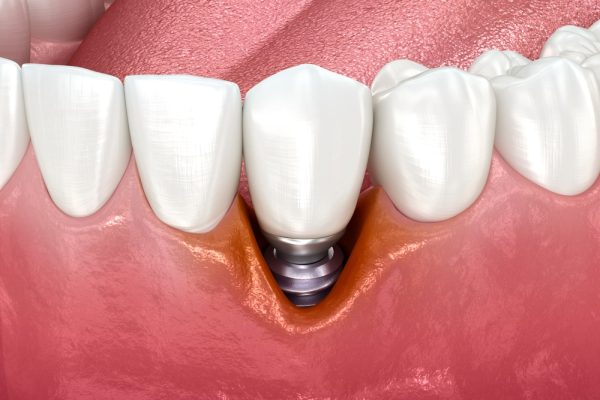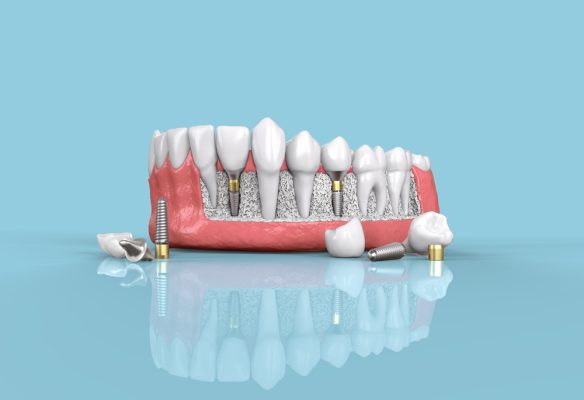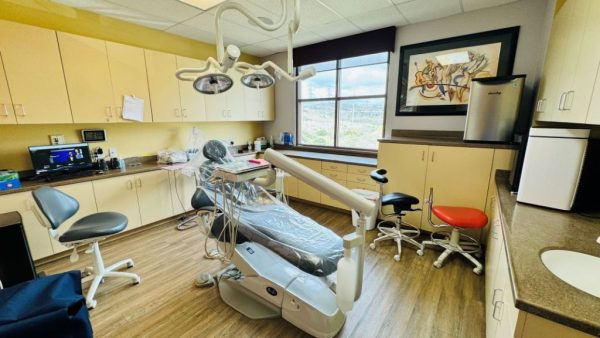Are You Dealing with Failing Dental Implants? Contact Our Board-Certified Periodontist Near You for Help
While dental implants have a success rate of 95%, in some cases, dental implants may fail. Failing dental implants can cause pain, discomfort, and various other complications. Are you suffering from implant failure? Or, maybe you’re unsure if the symptoms you’re experiencing point to dental implant failure. Either way, our San Clemente periodontist is here to help. Dr. Raymond L. Wright Jr., a board-certified periodontist with decades of experience, specializes in advanced treatments like the LAPIP® (Laser-Assisted Peri-Implantitis Procedure) to address peri-implantitis and other implant complications.
If you’re dealing with signs of dental implant failure, contact our periodontist near you today at (949) 361-4867 to schedule an appointment.

Common Causes of Dental Implant Failure
Several reasons may cause a failing dental implant:
- Peri-implantitis (Infection): Peri-implantitis is a bacterial infection that affects the gum and bone around the implant, similar to gum disease. If untreated, it can cause bone loss and implant loosening. Poor oral hygiene, smoking, or pre-existing periodontal disease increase the risk.
- Osseointegration Failure: Osseointegration is the process where the implant fuses with the jawbone. If this process fails due to insufficient bone density, excessive force, or improper placement, the implant may become unstable.
- Overloading: Excessive pressure on the implant, such as from teeth grinding (bruxism) or premature loading before full healing, can disrupt integration and lead to failure.
- Medical Conditions: Conditions like uncontrolled diabetes, autoimmune disorders, or osteoporosis can impair healing and bone health, increasing the risk of implant failure.
- Poor Surgical Technique: Inexperienced dentists or improper dental implant placement can lead to complications, such as nerve damage or misalignment, causing the implant to fail.
- Lifestyle Factors: Smoking, heavy alcohol consumption, and poor nutrition can hinder healing and compromise implant success.
Symptoms of a Failed Implant
Early detection is critical to addressing implant complications. Common signs of implant failure include:
- Persistent Pain or Discomfort: Mild soreness after surgery is normal, but ongoing or worsening pain may indicate a problem.
- Swelling or Redness: Inflammation around the implant site, especially months after placement, could signal infection.
- Implant Mobility: A loose or wobbly implant is a red flag for osseointegration failure or bone loss.
- Gum Recession: Receding gums around the implant may expose the metal post, increasing infection risk.
- Difficulty Chewing: Pain or instability when biting or chewing can indicate an issue with the implant or surrounding bone.
- Bad Breath or Taste: Persistent bad breath or a metallic taste may point to peri-implantitis or infection.
Experiencing dental implant failure? Don’t fret! Dr. Wright is here to help ease your pain and get your smile back to normal. Contact our dental office in South Orange County by calling (949) 361-4867.

The LAPIP® Solution for Failing Implants
At Wright Perio & Implants, we proudly offer the LAPIP® (Laser-Assisted Peri-Implantitis Procedure), the only FDA-cleared laser treatment for addressing peri-implantitis and saving failing dental implants. This minimally invasive procedure uses the PerioLase® MVP-7™ laser to target and eliminate diseased tissue and bacteria without harming healthy tissue, promoting bone regeneration and implant stability.
LAPIP® is a specialized adaptation of the LANAP® (Laser-Assisted New Attachment Procedure) protocol, designed specifically for dental implants. It addresses peri-implantitis, a condition caused by a bacterial infection that leads to inflammation and bone loss around the implant. The procedure uses laser technology to:
- Remove Diseased Tissue: The PerioLase® MVP-7™ laser selectively vaporizes infected tissue and bacteria while preserving healthy tissue.
- Eliminate Titanium Contaminants: The laser removes corrosion byproducts that can exacerbate inflammation.
- Promote Bone Regeneration: Clinical studies show that LAPIP® facilitates bone regrowth, with a 95% success rate in stabilizing failing implants.
- Create a Clean Healing Environment: The laser seals the treatment area, reducing bleeding and swelling for faster recovery.
The LAPIP® Procedure at Wright Perio & Implants
Here’s what to expect during your LAPIP® treatment:
- Comprehensive Evaluation: Dr. Wright uses 3D Cone Beam CT imaging and perio probes to assess the pocket depth and bone loss around the implant.
- Laser Treatment: A thin laser fiber is used to target and remove diseased tissue, bacteria, and contaminants without cutting the gums.
- Bone Stimulation: The laser promotes bone regeneration to stabilize the implant.
- Post-Treatment Care: Patients receive detailed aftercare instructions to ensure optimal healing, with minimal downtime.

What Patients Are Saying
Don’t just take out word for it! See what some of our patients are saying about their experiences at Wright Perio & Implants:
- “Dr. Wright is the most knowledgable surgeon. He explained the procedures to me in detail and also in writing. He was so patient when I had lots of questions. I did many hours of research prior to deciding on Dr. Wright. i had prior work done at a different dentist and the bone grafts failed. So i had to find a surgeon that could fix the prior work done on my mouth. Dr. Wright was the perfect choice. The tissue transfer was completed one week ago meticulously. Dr Wright will be doing future bone grafts for my implants and i finally know that i am in the hands of the best surgeon in Orange County. His office staff have been so accommodating and kind. Thank you to Dr. Wright and his Team! See you soon for next step.” – Susan T.
- “The best dental office and staff I’ve ever had!! Super appreciate all the teamwork in getting my teeth healthy again and can’t thank you enough!!! A+++!! Thank you very much and the first time I can say this.. “Looking forward to my next visit!” – Brett T.
To schedule an appointment at our dental office near you, contact our team at (949) 361-4867.
Preventing Dental Implant Failure
Fortunately, dental implant failure is rare and can often be prevented:
- Maintain Excellent Oral Hygiene: Brush twice daily, floss around the implant, and use an antimicrobial mouthwash. You may consider a water flosser for hard-to-reach areas.
- Attend Regular Dental Checkups: Professional teeth cleanings and exams at Wright Perio & Implants every 6 months help catch issues early.
- Quit Smoking: Smoking cessation programs can improve healing and reduce infection risk.
- Manage Health Conditions: Work with your doctor to control diabetes, osteoporosis, or other conditions that affect healing.
- Wear a Nightguard: If you grind your teeth, a custom nightguard can protect your implants.
- Choose an Experienced Implant Dentist: Research your dentist’s credentials, reviews, and success rates with implants.
Frequently Asked Questions
In many cases, yes. Treatments like antibiotics, professional cleanings, or bone grafting can stabilize the implant. However, severe cases may require removal and replacement.
Early-stage peri-implantitis can often be reversed with professional cleanings and improved oral hygiene. Advanced cases may require surgery.
Yes, after addressing the underlying cause and allowing the site to heal, a new dental implant can often be placed successfully.
Dental Implants That Last a Lifetime at Wright Perio & Implants
If you suspect signs of dental implant failure, don’t hesitate to reach out to our San Clemente periodontist. With extensive experience in implant dentistry, we can get your oral health back on track. Contact our dental office in South Orange County today by calling (949) 361-4867.
